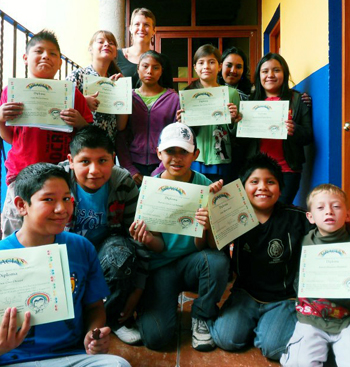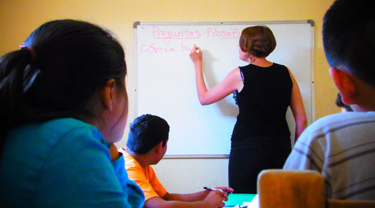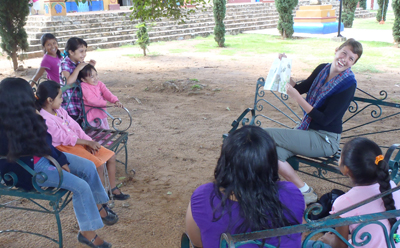In a small classroom in Oaxaca, Mexico, Amy Reed-Sandoval hovers near a whiteboard as she guides a class discussion about individual rights. A dozen students debate the issue while Reed-Sandoval, a UW doctoral student in philosophy, gently reminds them to employ logic in their arguments. The discussion is lively but respectful—with an occasional eruption of giggles. The students are, after all, preteens and teens.
Reed-Sandoval has taught in Oaxaca for the past three summers, encouraging budding young philosophers through a course offered in a partnership with Centro de Esperanza Infantil (Centro), a local non-governmental organization (NGO). Centro serves some of the city’s poorest families, most of them from indigenous groups. “A typical session might begin with discussion of an ancient metaphysical puzzle and finish with a student-led dialogue on what it means to be indigenous,” says Reed-Sandoval.
Inspiration for the program came from theUniversity of Washington Center for Philosophy for Children, which trains UW students to introduce philosophy in Seattle-area schools. Reed-Sandoval dreamed up the idea of a similar program in Oaxaca while conducting dissertation research there. She contacted Centro due to its heavy emphasis on education.

“Oaxacan classrooms can have 60 children taught by a single teacher,” says Reed-Sandoval. “When you have a lot of overcrowded classrooms and lack of resources for teachers, the students don’t get many opportunities to share their opinions and engage philosophically with their peers in class. I explained to Centro that my program would provide those opportunities.”
Centro agreed to provide classroom space—and students—for Reed-Sandoval, while the UW Center for Philosophy for Children provided start-up funds for the purchase of books and other classroom materials. The UW Department of Philosophy and the UW Center for Human Rights have provided funds in subsequent years; Reed-Sandoval also has received mentorship from the UW Latin American and Caribbean Studies Program.
The basic premise of the program is that children, naturally drawn to philosophical questions, will pose and respond to those questions with the right encouragement and guidance. Picture books often serve as an effective jumping off point. “It’s important that the questions you explore come from the kids themselves,” says Reed-Sandoval. “The first summer, I didn’t realize that they could generate the questions. I would read a story and present questions. But I have since learned that you just need to be patient and the questions come. When the students take the lead, they get more excited about philosophy and more invested in it.”
Topics have included individual rights, self-esteem, the nature of happiness, and fear of death. The discussion is particularly lively when the class explores discrimination—something that indigenous youth face on a daily basis. “Some of my students report being shooed out of places because of how they look,” explains Reed-Sandoval, “so when we discuss how people judge each other based on appearance, there’s a huge response.”

Reed-Sandoval, who has led similar discussions with children in Seattle classrooms, finds that American youth are sometimes more comfortable sharing their views than their Oaxacan counterparts. “In Oaxaca, I have to work hard to empower students and get them to start sharing their views,” says Reed-Sandoval. “It’s been great to watch them start speaking up in public and building their self-confidence. I believe it will help them be a bit more in control of their lives, in their work and also in their personal relationships.”
It's been great to watch them start speaking up in public and building their self-confidence. I believe it will help them be a bit more in control of their lives, in their work and also in their personal relationships.
Reina Cristina Garcia Cruz, whose son and daughter have participated in the Oaxaca program for three years, agrees. “I think that this [program] helps them open their minds to more things,” says Cruz. “Now, when they have a problem, they don’t just deal with it superficially. Instead they analyze it and figure out the causes and reasons behind what is happening. They explore problems more deeply, and I feel that this is going to help them in their futures.”
One Oaxacan student has been so inspired by the class that she has expressed an interest in pursuing a PhD in philosophy. (Centro provides support for Oaxacan youth seeking a college education.) “I know she’s capable of doing it,” says Reed-Sandoval. “She‘s been thriving in the philosophy class. We’ve talked about what’s involved, and all the challenges there will be along the way.” The pair have agreed to check in monthly (thanks to Centro’s computers), at which time the student will share a philosophical question that she has raised and explored that month. “This is something of an experiment,” says Reed-Sandoval, who is contacting NGOs to identify other sources of educational support for the girl. “Her job is to start thinking of herself as an intellectual who has ideas that can shape the world.”

Although most of Reed-Sandoval’s Oaxacan students have no intention of becoming professional philosophers, she still sees tremendous value in their time together. “They live in a world in which they’re often told that their voice isn’t so important,” says Reed-Sandoval. “In the philosophy classroom, this is an opportunity for them to say, ‘As a matter of fact my thoughts are important, my questions are important, and my voice matters.’ Gaining that self-confidence is a key part of what they need to become leaders in their community, to become politically engaged in a way that’s meaningful for them, and to live the rich, confident life that human beings are entitled to.”
While Reed-Sandoval is studying at the UW—she’s now a fifth-year doctoral student—she is limited to summer stays in Oaxaca. But she hopes to expand the program to a year-round offering, perhaps making it the centerpiece of a study abroad program when she becomes a philosophy professor.
“My Centro students are dedicated, talented, and sincere as they develop their philosophical talents, and I am honored to work with them,” she says. “This project has been a highlight of my graduate school experience, and I look forward to seeing how it continues to unfold.”
More Stories

AI in the Classroom? For Faculty, It's Complicated
Three College of Arts & Sciences professors discuss the impact of AI on their teaching and on student learning. The consensus? It’s complicated.

A Sports Obsession Inspires a Career
Thuc Nhi Nguyen got her start the UW Daily. Now she's a sports reporter for Los Angeles Times, writing about the Lakers and the Olympics.

A Healing Heart Returns
In February, the UW Symphony will perform a symphony that Coast Salish elder Vi Hilbert commissioned years ago to heal the world after the heartbreak of 9/11. The symphony was first performed by the Seattle Symphony in 2006.